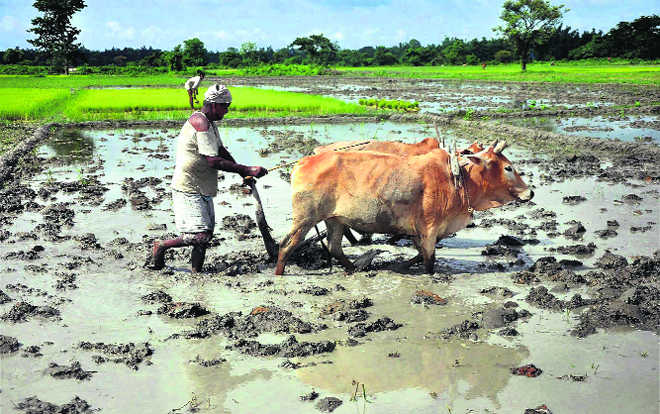
Economic Survey findings do not augur well for the Union Government’s target of doubling farm income by 2022. tribune file photo
Vibha Sharma
Tribune News Service
New Delhi, January 29
Identifying agriculture as one of the focus areas along with employment and education, the Economic Survey has advocated “dramatic” improvement in irrigation, new technologies and replacing untargeted subsidies in power and fertiliser by direct income support for sustaining the sector.
More broadly the cereal-centricity of current policy needs to be reviewed, it said. The last few seasons have witnessed a problem of plenty — the farm revenue is declining for a number of crops despite increasing production and market prices falling below the minimum support price (MSP).
(Follow The Tribune on Facebook; and Twitter @thetribunechd)
Productivity will have to be increased, and price and income volatility reduced, against the backdrop of increasing resource constraints. Climate change, as per the survey, could reduce annual farm incomes in the range of 15-18 per cent on average, and up to 20-25 per cent for un-irrigated areas.
India needs to spread irrigation and do so against a backdrop of rising water scarcity. At present, about 45 per cent of the farm land is under irrigation.
“Climate change — whose imprint on the Indian agriculture is already visible — might reduce farm incomes by up to 20-25 per cent in the medium term,” it warns. In terms of money, this translates into more than Rs 3,600 a year for the median farm household. The observations are significant in the backdrop of the Narendra Modi government’s aim to double the farmers’ income by 2022. As per the economic report card of the government for 2017-18, extreme temperature shocks reduce farmer incomes by 4.3 per cent and 4.1 per cent during kharif and rabi seasons, respectively, whereas extreme rainfall reduces incomes by 13.7 per cent and 5.5 per cent, respectively.
Shortages of water and land, deterioration in soil quality, and of course climate change-induced temperature increases and rainfall variability, are all going to impact agriculture. It is therefore opportune to analyse the effects of climate on Indian agriculture, it says. Since agriculture is a state subject and an open political economy question, a mechanism similar to the GST Council is required to bring more reforms in the agriculture sector and boost farmers’ income.



























